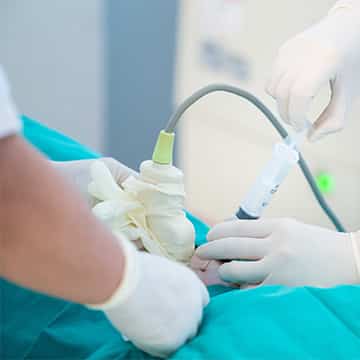
QUICK LINKS

What is Amniocentesis?
Amniocentesis is a procedure to remove a small sample of amniotic fluid for testing. Amniotic fluid is the fluid that surrounds and protects the baby during pregnancy. It contains various proteins, enzymes, hormones, and cells shed by the fetus. These cells contain genetic information that can be used to diagnose genetic or chromosomal conditions such as Down syndrome, Edward’s syndrome, or Patau’s syndrome.
“I highly recommend Dr. Tepper!He is highly professional, experienced, and calming. My pregnancy and birth were such a positive experience thanks to him and his lovely staff at the clinic.”
SEE MOREWhen is Amniocentesis Offered?
This test is usually only offered to pregnant women who have a higher chance of their baby having a genetic condition. This may be determined due to many reasons, including a prenatal screening test that suggested the baby may be born with such a condition, if you have had a previous pregnancy that was affected by a genetic condition, or if you have a family history of certain genetic conditions.
While this test is often offered to women who are 15-20 weeks pregnant who have a greater risk for birth defects, there are many different reasons why amniocentesis may be performed, including:
- Genetic testing: This test can be performed to test for certain conditions such as Down syndrome.
- Diagnosis of fetal infection: Amniocentesis can be used to test a baby for infection or illness.
- Fetal lung testing: This exam can be used to determine if a baby’s lungs are mature enough for delivery.
- Paternity testing: DNA can be collected from this test to be compared to the DNA of a potential father.
If you are offered this testing option, Dr. Tepper will speak with you regarding what the test involves, as well as possible benefits and risks to help you make the best decision for you and your family.

MEET DR. ALEX TEPPER
Welcome to my practice. Let me introduce myself and my practice philosophy. I am a board certified OB/GYN in practice for over 20 years and have been a solo-practitioner on the Upper East Side of Manhattan since 2000. All deliveries are performed at The Mount Sinai Medical Center where I went to medical school and at Lenox Hill Hospital.
The Amniocentesis Procedure
Your amniocentesis procedure will begin will an ultrasound to determine the baby’s location in your uterus. During an ultrasound, you will lie on your back on the exam table and a gel will be applied to your abdomen. A small device called a transducer will then be placed onto your skin to show the baby’s positioning on a monitor. Next, your stomach will be cleaned with antiseptic and a thin, hollow needle will be inserted through the abdominal wall and into the uterus. A small amount of amniotic fluid will be collected into a syringe, and the needle will be removed.
Following this procedure, your doctor will continue to monitor you and your baby for a set amount of time. Some patients may experience cramping following the procedure, which should resolve with time. After you return home, we recommend avoiding strenuous activities for at least 24 hours.
The amniotic fluid sample will be sent to a genetics lab and the results will then be shared with your doctor. Dr. Tepper will speak with you regarding your results and any necessary next steps.
BOOK AN APPOINTMENT
Whether you are a new or returning patient, Dr. Tepper can assess your concerns and discuss your options to find the most comfortable and convenient care for you. To get started, call our office to set up an appointment.
CALL FOR APPOINTMENTContact Us to Learn More
For compassionate and professional care, contact our office today to schedule an appointment with Dr. Tepper. We will be happy to answer any questions that you may have.
Our Blog

Your Guide to Understanding Placenta Previa

The Benefits of Having a Spanish-Speaking OB/GYN in Manhattan



